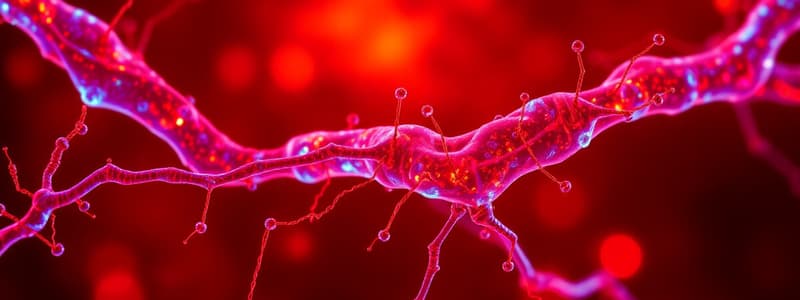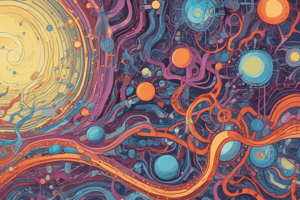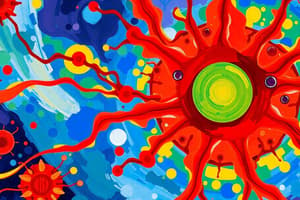Podcast
Questions and Answers
What is signal transduction?
What is signal transduction?
- A type of cellular communication
- Conversion of a signal from one physical form to another (correct)
- Detection of signals through sensory organs
- The physical contact between cells
Which type of signaling acts on self?
Which type of signaling acts on self?
- Neuronal
- Paracrine
- Autocrine (correct)
- Endocrine
What happens to cells that do not receive signals?
What happens to cells that do not receive signals?
They die.
Molecular switches only turn proteins off, not on.
Molecular switches only turn proteins off, not on.
What role does calcium play in cellular communication?
What role does calcium play in cellular communication?
What is a signal cascade?
What is a signal cascade?
The primary role of __________ is to allow the passage of ions into the cell.
The primary role of __________ is to allow the passage of ions into the cell.
What is the effect of acetylcholine in the nervous system?
What is the effect of acetylcholine in the nervous system?
Which types of receptors can enter the cell?
Which types of receptors can enter the cell?
Which of the following cellular responses can happen at different speeds?
Which of the following cellular responses can happen at different speeds?
Flashcards are hidden until you start studying
Study Notes
Cellular Communication
- Cells use signal transduction mechanisms to communicate and sense their environment.
Signal Transduction
- The conversion of a signal from one physical form to another.
Types of Cell Signaling
- Endocrine: Hormones travel long distances.
- Paracrine: Signals act in the local vicinity.
- Neuronal: Signals travel very short distances.
- Contact-dependent: Signals require physical contact between cells.
- Autocrine: Signals act on the same cell that produced them.
Signal Molecule Interactions
- The same signal molecule can have different effects on different target cells.
- Cells typically respond to a combination of signals.
Signal Cascades
- A chain of events that relays information from the site of reception to the point of action.
- Signal cascades often amplify the signal, converting a small input into a large response.
Signal Molecule Targets
- Some signal molecules act at the cell surface, while others can enter the cell and act internally.
- Steroids are examples of signal molecules that can enter cells.
Ion-Channel Linked Receptors
- All nerve impulses are generated through ion-channel linked receptors.
- Neurotransmitter release causes ion channels to open, allowing ions to flow into the cell.
- These ion flows propagate the signal through the nerve cell.
Molecular Switches
- Many interactions within the cell act to turn proteins on or off.
Speed of Cellular Responses
- Some cellular responses are rapid, while others are slow.
Calcium as an Intercellular Messenger
- The concentration of calcium is extremely low in the cytoplasm.
- Calcium influx can trigger cell division and other processes.
- Example: Fertilization triggers a wave of calcium influx.
Photoreceptors in the Eye
- The eye has two types of photoreceptors: rods and cones.
- Cones are further divided by the wavelength of light they respond to (red, green, blue).
- Signal cascades in photoreceptors amplify light signals.
Studying That Suits You
Use AI to generate personalized quizzes and flashcards to suit your learning preferences.




